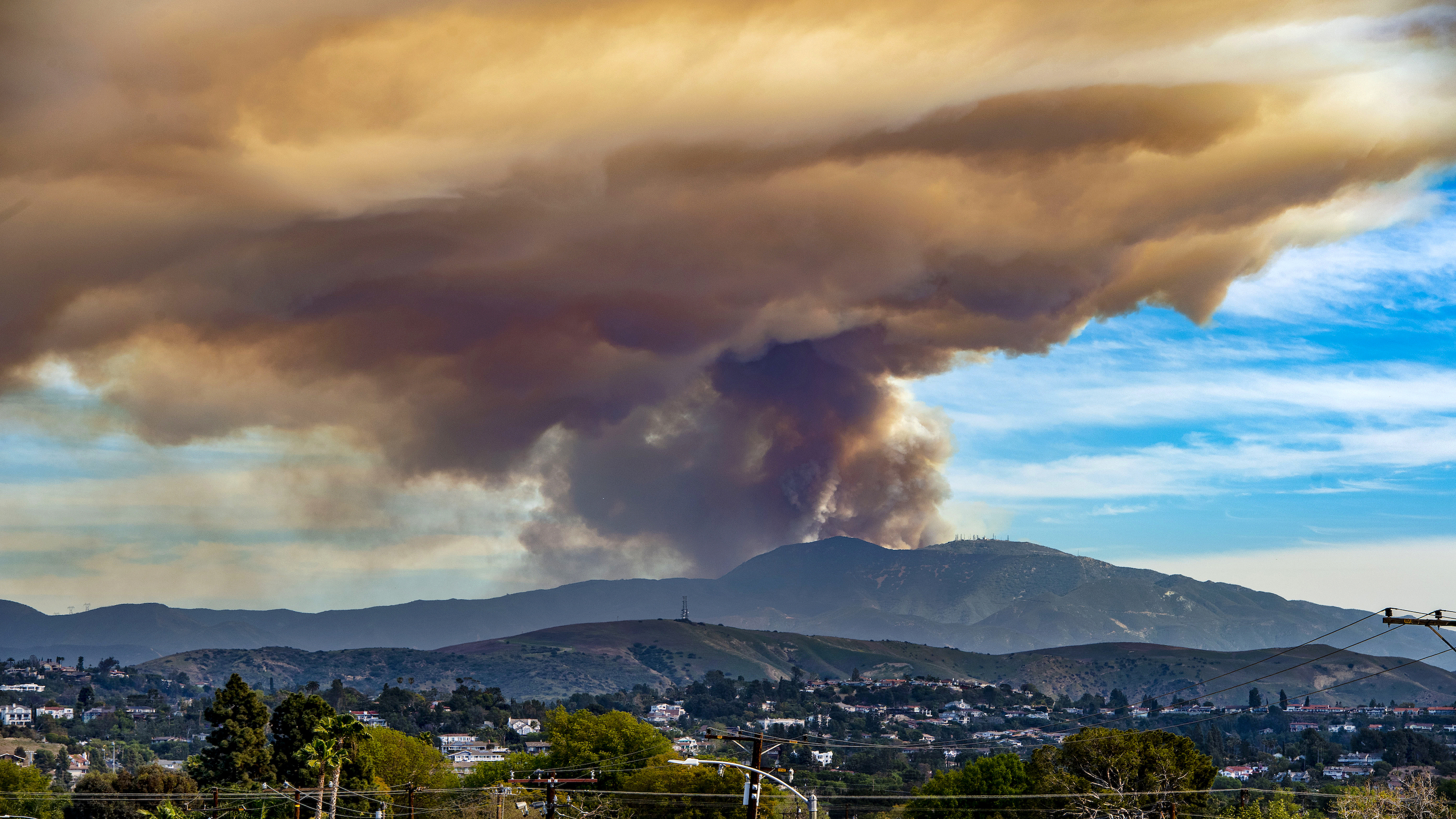It's 'now or never' to stop climate disaster, UN scientists say
The technology already exists to cut emissions by 50%, according to scientists.

The time is "now or never" to limit catastrophic temperature rises and climate breakdown, UN scientists have said in a final warning to governments.
"Rapid, deep and immediate" cuts to global carbon dioxide emissions, which need to begin declining by 2025 and halve by 2030, must be made immediately across every section of society if temperature changes are to remain at or below the dangerous threshold of 2.7 degrees Fahrenheit (1.5 degrees Celsius), according to a new report by the UN's latest Intergovernmental Panel on Climate Change (IPCC).
The report, which assesses the mitigation strategies available to combat climate change, says that even if all the carbon-cutting policies previously promised by governments had been fully implemented by 2020, the world would still warm by a disastrous 5.8 F (3.2 C).
Related: Could climate change make humans go extinct?
But cuts to global emissions alone won't be enough. The need for widespread use of controversial carbon capture technologies — which promise to suck carbon from the air and put it into storage but have yet to be demonstrated at scale — are "unavoidable" if the world is to stay within the 1.5 C limit, the report's authors wrote. These technologies will need to be accompanied by the planting of new forests and shifts in the preservation of soils, as well as the development of hydrogen fuels and the redesigning of transport systems and cities.
The UN's Secretary-General Antonio Guterres called the report "a file of shame cataloging the empty pledges that put us firmly towards an unliveable world."
"We are on a fast track to climate disaster: Major cities underwater; unprecedented heat waves; terrifying storms; widespread water shortages; and the extinction of a million species of plants and animals," Guterres said in a news briefing Monday (April 4). "Some governments and business leaders are saying one thing but doing another. Simply put, they are lying. And the results will be catastrophic."
Sign up for the Live Science daily newsletter now
Get the world’s most fascinating discoveries delivered straight to your inbox.

The report, the third and final section of the IPCC's Sixth Assessment Report, is the product of two weeks of virtual negotiations between 278 climate scientists and officials from nearly 200 countries, who vetted its 63-page summary to politicians line by line before its release.
Intense disagreements between scientists and governments over the contents of the summary quashed hopes of completion by Friday (April 1), turning the final stages of the session into a 48-hour weekend slog to wrap up the summary.
The most contentious wranglings were over how much funding the report recommends be given to developing countries; the role of carbon capture technology in meeting the crisis; and the future usage of fossil fuels. IPPC reports typically take six to seven years to complete, meaning that this report is likely the UN body's final warning before irreversible climate breakdown — which scientists say will include the total collapse of most of the Greenland and west Antarctic ice sheets; extreme heat waves; severe droughts; water stress; and extreme weather across large parts of the globe — becomes unavoidable.
"We are at a crossroads. The decisions we make now can secure a liveable future. We have the tools and know-how required to limit warming," said IPCC Chair Hoesung Lee.
According to the IPCC, the problem is political, not technological. Humanity already has the technology needed to cut global greenhouse gas emissions by at least 50% by 2030, and a lot of the measures are low-cost and could even save money. These include increased investment in renewable energy sources, further soil sequestration of carbon, reductions to methane emissions and improvements to energy efficiency.
Related: What countries and cities will disappear due to rising sea levels?
The report also notes that the cost of solar, wind power and lithium battery technologies have fallen precipitously since 2010, making the economic benefits of limiting warming to 3.6 F (2 C) or lower much greater than the cost incurred by the transition.
The energy sector will have to reduce its fossil fuel consumption substantially, improve its efficiency, and resort to alternative fuels, according to the report.
"Having the right policies, infrastructure and technology in place to enable changes to our lifestyles and behaviour can result in a 40-70% reduction in greenhouse gas emissions by 2050. This offers significant untapped potential," Priyadarshi Shukla, the co-chair of the IPCC Working Group which wrote the report, said in a statement. "The evidence also shows that these lifestyle changes can improve our health and wellbeing."

Longer-term solutions, like widespread carbon capture, will also be needed to remove residual emissions from sectors such as aviation, agriculture and industry, according to the report, although the technologies face significant environmental, economic and technological barriers which could limit their viability.
So far, the only scaled-up carbon capture methods are those of reforestation, improved forest management and carbon sequestration in soil, but the IPCC authors note that the carbon stored by these mechanisms is prone to sudden release through forest fires and the human demand for resources — both of which could be exacerbated by climate breakdown.
Keeping warming within 1.5 C will also require the further development of nascent technologies to suck the carbon dioxide directly from the atmosphere, and large spaces to store it underground. But the IPCC authors included criticisms of many of the notable examples of these, such as direct air carbon capture and storage (DACCS) (which takes carbon directly from the atmosphere) and Bioenergy with Carbon Capture and Storage (BECCS) (which captures carbon dioxide in plants before turning them into pellets). The first, the authors noted, could potentially increase emissions in other areas of production, while the second approach needs a lot of water and could negatively impact biodiversity.
"Removing carbon from the atmosphere will be necessary to achieve 1.5˚C but the latest IPCC report also shows that it won't be a panacea," Taylor Dimsdale, a director on risk and resilience at the climate think-tank E3G, said in a statement. "To avoid worst case scenarios and unmanageable impacts, the promise of negative emissions at some future point in time must not be used as an excuse to delay action on efficiency and the deployment of renewables now."
Related: When did scientists first warn humanity about climate change?
The report also highlights the importance of climate justice to a successful transition. The wealthiest 10% of households contribute 36% to 45% of global greenhouse gas emissions, the IPPC authors wrote.
"Most of the people living on the front lines of the climate emergency have done the least to cause this problem," Fionna Smyth, head of global policy and advocacy at Christian Aid, a U.K.-based relief and development agency, said in a statement. "For example, despite accounting for 17% of the world's population, Africans contribute just 4% of global emissions. They need major emitters to take drastic action so that we can all have a safe and secure climate."
The report is the third of three parts, with the first report published in August 2021 and the second released in February. The first part dealt with the evidence of climate change and the second detailed climate change's impacts on human societies, finding that half the planet was highly vulnerable to climate crisis. A final summary report will be published later this year.
The report lands during a tumultuous time. Skyrocketing energy bills and commodity prices — caused by soaring gas prices and worsened by Russia's invasion of Ukraine — have severely impacted living standards that have not yet rebounded to pre-pandemic levels. This could make the rapid transition climate scientists are demanding more difficult to achieve, but some observers say it also highlights its necessity.
"It's game over for fossil fuels that are fuelling both wars and climate chaos," Kaisa Kosonen, a senior policy advisor at Greenpeace Nordic, said in a statement. "There's simply no room for any new fossil fuel developments and the coal and gas plants we already have need to close early."
Originally published on Live Science.

Ben Turner is a U.K. based staff writer at Live Science. He covers physics and astronomy, among other topics like tech and climate change. He graduated from University College London with a degree in particle physics before training as a journalist. When he's not writing, Ben enjoys reading literature, playing the guitar and embarrassing himself with chess.










